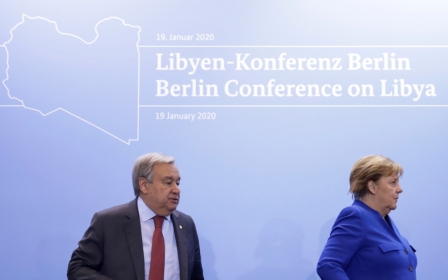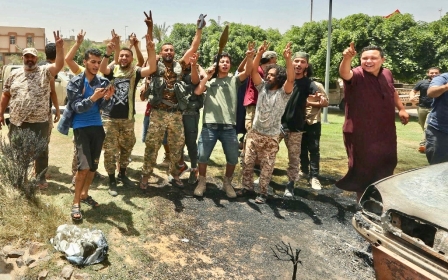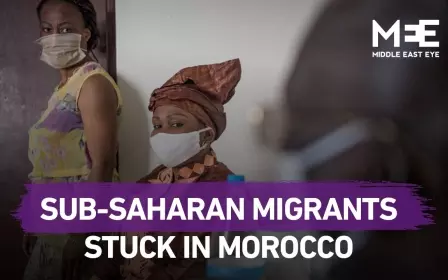Arabic press review: Egypt and UAE seek to salvage Haftar's role in Libya
Egypt, UAE in talks to halt GNA advances
Abu Dhabi and Cairo have been in contact with Washington and a number of European powers to force the Government of National Accord (GNA) and Turkey to halt ground advances in Libya, according to Al-Araby Al-Jadeed newspaper.
After a series of rapid victories, Turkish-backed GNA forces on Friday recaptured Tarhouna, the last major stronghold of eastern commander Khalifa Haftar near Tripoli, ending his 14-month offensive to capture the capital.
Western diplomatic sources in Cairo told London-based Al-Araby Al-Jadeed that Egypt and the UAE want government forces to settle for the gains they have achieved on the ground, and immediately begin political negotiations.
Haftar and his Libyan National Army (LNA) are backed by Russia, the United Arab Emirates and Egypt.
The sources said that Cairo had offered to hand over the city of Sirte without fighting, provided that the military operations against Haftar's forces stop.
They added that an initiative by Egyptian President Abdel-Fattah el-Sisi calling for a ceasefire to take place Monday evening was met with a sceptical response from Washington and Western powers.
They had noted that “it would be difficult to bind the GNA to a unilateral [ceasefire] date”, the sources said.
The sources described the initiative, revealed by Sisi on Saturday, as "no more than a dance of death, after Egypt and its axis lost their bet on Haftar’s militias.”
They added that Egypt is, in effect, the biggest losing side, especially since one of its regional competitors, Turkey, is now very close to its western borders, and even an economic competitor for the eastern Mediterranean gas.
The situation “also threatens the Egyptian dream of becoming an energy centre that transports gas to Europe. Meanwhile the UAE’s losses have been limited to the funds it spent in supporting Haftar militarily.”
Rising sea-based migration from Morocco
Moroccan security forces thwarted 10,311 migration attempts to Spain since the beginning of the year, London-based newspaper Al-Quds Al-Arabi reported.
More than 8,000 of the people seeking to cross to Spain are from Sub-Saharan Africa, and the rest are Moroccan citizens, sources at the Moroccan Ministry of the Interior said. The anti-trafficking operations dismantled 50 migrant smuggling networks, while security forces participated in the rescue of 1,282 people in high seas.
The Spanish interior ministry said 6,107 illegal immigrants have reached its territories by sea this year. The ministry also noted an upward trend of journeys towards the Canary Islands, with 2,475 arrivals, which is a rise of 2,000 percent compared to the same period in 2019.
While the road to the Canary Islands is longer and more difficult to migrate through, it costs less money, between $500 and $700 per person, because the risks are greater.
Moroccan police sources said that the coronavirus pandemic and the policies of closing borders and restricting movements have greatly reduced illegal crossings, by both land and sea. However, there hasn’t been detailed and comprehensive data on migration during the quarantine period.
Many Jordanian students without internet
World Bank figures showed that 16 percent of students in Jordan do not have access to the internet, adding a major obstacle to the distance learning process, according to the Jordanian newspaper Al Ghad.
The World Bank also revealed that one-third of Jordanian children do not have suitable computers for homework, which is far below the world average.
The spread of the coronavirus has forced countries to shut down schools, affecting 103 million students throughout the Arab region. Jordan was one of the first countries in the region to respond to the crisis, imposing curfews and closing all educational institutions in March.
The World Bank said that Jordan’s Ministry of Education has resorted to distance learning to sustain education during the pandemic. Officials were quick to employ the private sector to develop an education portal called “Darsak”, as well as launching two TV channels dedicated to providing video lessons, covering the main topics of the curriculum.
* Arabic press review is a digest of reports that are not independently verified as accurate by Middle East Eye
Middle East Eye propose une couverture et une analyse indépendantes et incomparables du Moyen-Orient, de l’Afrique du Nord et d’autres régions du monde. Pour en savoir plus sur la reprise de ce contenu et les frais qui s’appliquent, veuillez remplir ce formulaire [en anglais]. Pour en savoir plus sur MEE, cliquez ici [en anglais].




